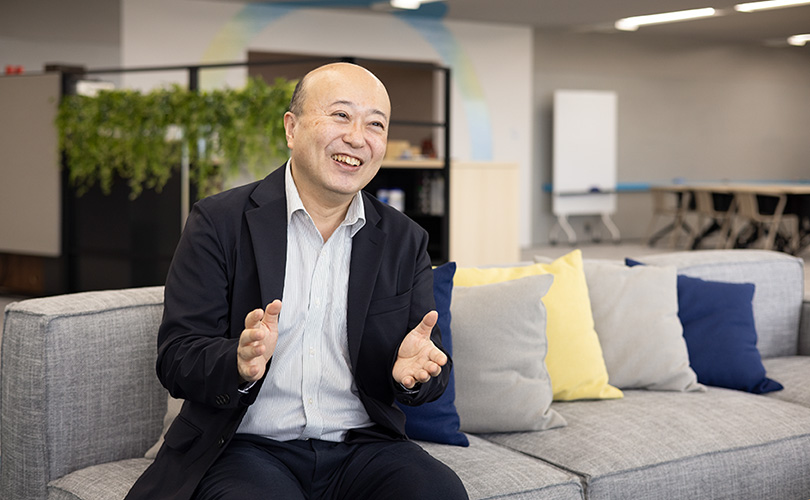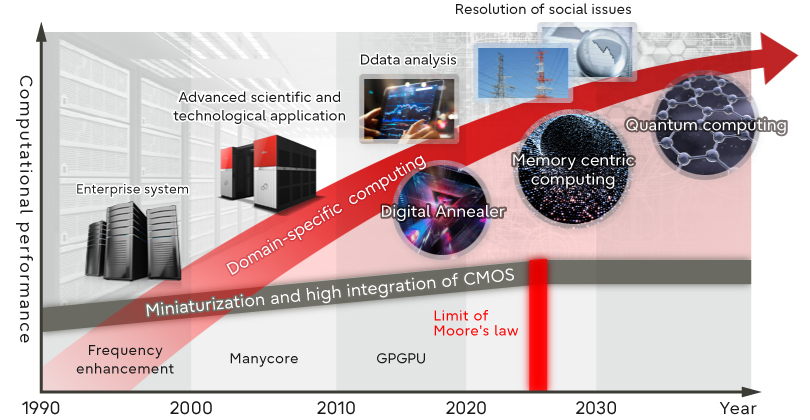Computing
Transforming Society in the Digital Age with the World's Most Advanced Computing
Naoki Akaboshi
SVP
Head of Computing Laboratory Research Unit Fujitsu Limited



Tackling the Challenges of Our Increasingly Complex Society and Ever Greater Reliance on Computation Power
Ever since the advent of computers over 70 years ago, their development has been based on "Moore's law", which states that performance improves exponentially in line with semiconductors’ miniaturization and integration. However, Moore's Law has now reached its limits, requiring the introduction of new architectures and paradigms for future computing innovation.
The smart society we live in today, underpinned by the advent of the digital age, relies on computers’ ability to solve increasingly complex business problems, with a significant impact on processing workloads. In the past, these involved principally office-based calculations and transactional processes. The picture today is very different, with rapidly accelerating workloads resulting from highly computer-intensive data analytics such as AI, machine learning and big data.
The siting of computing power has also shifted fundamentally – moving away from data centers to widely distributed mobile and edge devices. As computing demands grow across every segment of society, faster computers are absolutely critical if these are to be met.
The Computing Laboratory is leading the research and development of new computing technologies designed to meet these social needs. Based on the high performance computing and supercomputing technologies pioneered by Fujitsu over many years, this group is focused on advancing general-purpose computing technologies for small- to large-scale parallel processing and domain-specific computing technologies for specific high-speed processing applications.

Developing Advanced Computing That is Accessible to All
The Computing Laboratory has been closely involved in the development of various new technologies. These include the latest "Fugaku" supercomputer at the RIKEN Center for Computational Science and Technology, as well as the large-scale AI cloud computing system "ABCI; AI Bridging Cloud Infrastructure" at the National Institute of Advanced Industrial Science and Technology, and the stock trading system "arrowhead" at the Tokyo Stock Exchange based on these same technologies. By leveraging advanced technologies from other companies as well as Fujitsu's own high-quality technologies, we are able to achieve massively parallel computing environments that maximize performance for the latest demanding workloads.
At present, we are conducting R & D on "memory centric computing", which aims to improve performance by eliminating bottlenecks between processors and data, as well as on "optimized computing" that enables decision making in a complex and diverse society. We are also working on "heteroscaler computing", which makes the massively parallel high-performance computing that is indispensable for the evolution of AI readily available to everyone.
In the area of memory-centric computing, we are researching and developing completely different architectures and software to address the performance limitations between processors and memory known as the "von Neumann bottleneck". These seriously impede the performance of large-scale simulations required to process data scattered over large amounts of memory.
In the field of optimized computing, we are researching and developing optimization technologies that can solve large-scale combinatorial problems without expert coordination, as well as streaming optimization technologies that can keep up with real-time situations. In the field of heteroscaler computing, our R&D revolves around fundamental technologies that maximize computing performance by hiding the computing environment.
We have achieved some impressive concrete research results, including a world-first advance with our "Digital Annealer" which employs an annealing method (algorithm specific to combinatorial optimization problems) that is inspired by quantum phenomena from the digital circuit technology of silicon semiconductors. Another is our "Content-Aware Computing", which achieves both calculation accuracy and the speeding up of AI/machine learning processing by automatically controlling calculation accuracy.
In addition, the Quantum Laboratory is engaged in medium- to long-term research towards the realization of quantum computers, including joint research projects with global research institutes across all technological layers of quantum computing. One of Fujitsu's key strengths is that these R & D activities are conducted not only at our sites in Japan, but also at overseas R & D sites in North America, Europe, China, and beyond, as well as at world-class research institutions. We are all working together to conduct multi-disciplinary research, from hardware such as quantum devices to software and algorithms.

Realizing Diverse Innovation, Including Drug Discovery, Logistics, and Design
The Computing Laboratory aims to contribute to social change in the digital age by promoting the research and development of these important computing technologies.
For example, in the design process of the automobile, railway, and aircraft industries, high-precision analysis of large-scale fluid and noise simulations is a major challenge. In the pharmaceutical industry, we have concentrated our efforts on the process of mid-molecular drug discovery in order to explore structures by molecular dynamics simulation. These are all problems caused by the von Neumann bottleneck, so we have proved that by radically rethinking your computing architecture and replacing manpower with computers, you can genuinely start to innovate.
We are also confident that if combinatorial optimization technologies such as those in Digital Annealer are applied, we can realize further innovations in both manufacturing and logistics. An example is the real-time optimization of the supply chain to eliminate unnecessary processes and reduce costs, as well as dynamically enhancing the entire process from procurement to manufacturing and shipping in order to achieve production plans tailored to individual specifications. Expectations are also high for Digital Annealer in the area of drug discovery. In 2021, this approach was used to shorten the development period for a new type of coronavirus infectious disease treatment.
Looking further ahead, we believe that introducing heteroscaler computing technology capable of automatically extracting the processing power of domain-specific computers will enable non-expert application developers to utilize general-purpose and domain-specific computers fully, accelerating the innovation process.
Fujitsu's Computing Laboratory’s strength lies in our ability to conduct R & D on top-level computing technologies that will realize important social changes and achieve tangible results. Thanks to our advanced computing technologies, we are able to provide uniquely superior services that no other company can replicate. Stay tuned for Fujitsu's cutting-edge computing technologies.
 Fujitsu's approach to computing
Fujitsu's approach to computing



